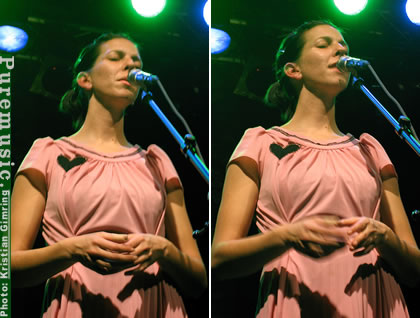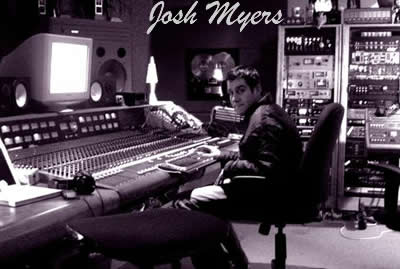
A Conversation with Rosie Thomas (continued)
PM: Along with Denison and Sufjan, it seems, looking and listening from where I am, that Josh Myers was also very important to this record.
RT: Josh Myers, I would say, saved the record.

Because when Suf and Denny and I put this whole thing together--I'm sure you've read this in bios--it wasn't a plan to put a record out. It was just time that I had to get away from Seattle and Sufjan needed a break from music just to do something for fun. And we had a long phone conversation, which led to the beginning of recording this record, where he just said, "Come up to New York, let's just record for fun. Let's write stuff together. We don't have to do anything with it. When is the last time you did that, Rosie?"
PM: Just for fun.
RT: Yeah, just to hear it and learn from it, and think, wow, if I really had the money, I sure would really like to put trumpet on that or drums. And so that's how the beginning of the process came about, and basically we recorded a couple of songs that time around. Then I came back again, and we ended up, I think, recording the rest of it. And then Denison got involved, he heard that--"Are you guys recording stuff?" We said yes. He was in Philly, of course. He said, "Well, Rosie, do you want come see me in Philly, because I'd love to hang out with you. I'll pay for your bus ticket if you come down here." I was like, "All right." And so I went down there. And then he said, "Hey, I've got a couple songs I want to record. Can we do 'Songbird'? I've always wanted to hear you sing it."
PM: Wow.
RT: All of a sudden, we'd recorded five songs together while I was there with him. And then he decided, "I'll come back to New York with you, and we'll do a couple more with Suf." Then all of a sudden we had nine songs.
PM: So what were each of the guys recording on? Did they have Protools on their laptops?
RT: Protools, that's it, in their bedrooms, recording all the songs.
Sufjan still uses an 8-track. We recorded most of the songs on his 8-track player.
PM: Ah. A reel-to-reel, or a cassette machine?
RT: Cassette.
PM: Wow. He's got an 8-track cassette machine?
RT: Yeah. That's what he used for most of his records.
PM: Are you kidding me? I had one of those with my brother in Germany; they sound pretty fat.
RT: Yep, it's crazy. And then I believe he then dumps it down to Protools so he can edit it. That's what we recorded on, all those songs we did, I would say a good half of them were with that.
PM: So his master machine is a cassette machine.
RT: I'm telling you, it's his state of mind. He doesn't want to own anything. I think for the first time he owns an instrument. He used to borrow them from people.
PM: What?
RT: He's a minimalist. He does not want to own anything. Like if you went to his apartment, he just doesn't--
PM: What's his religious orientation, or spiritual orientation?
RT: He's Christian. And he has photos. He keeps his photos, he's always taking photos, that's his big thing. But he doesn't really own anything. He's very much a minimalist.
PM: Not into things.
RT: And he doesn't get into material things. So he's got an 8-track, he uses that 8-track still. And it's hilarious. If I'm not mistaken, the Michigan record was made on that 8-track, and then he just dumps it onto Protools. But that's mostly where he got all his sounds from. He has a way of capturing sounds. When we did the record we would sit on his couch, just put the microphone in the middle of the room, press record, and just sing.
PM: Get out of here.
RT: I swear to God. Most of it was--it was the laziest, most hilarious recordings I've ever done.
PM: Do you know what mic he was using?
RT: I don't think he even has a lot of expensive equipment, that's the thing. Denison is a little more of a tech-y dude, more of a gear head. But what we did is Denison came down with his laptop, he had Sufjan dump all of the 8-track onto his laptop, so that did it all in Protools sessions. At this point, still, there was no point in doing anything with this record.
PM: It wasn't making a record, just organizing the songs.
RT: Just organizing the songs, and like, "This would be fun to have. Maybe, Rosie, you could give it to your family, or you could do something with it." And Sufjan said, "Jeez, Rosie, maybe Asthmatic Kitty should put it out." I thought, well--my contract with Sub Pop was pretty much at an end, and I thought, well, that would be kind of a neat detour for a record. And I came home and kind forgot about it. And then Denison finally sent me the files. Because he'd worked on it, he started mixing things. He said, "I think you're going to be blown away at what we've done. I don't know how, I don't even remember recording some of it, but it's pretty amazing."
PM: It's a beautiful record.
RT: I mean, we did this stuff so casually, and so loosely, it was hilarious. I wrote a song in the kitchen and ran out--
PM: Which one?
RT: Oh, gosh, "Why Waste More Time?" It's the first one on the record.
PM: Right.
RT: I just wrote it in the kitchen, and I came running out and was like, "Yeah, I just wrote a song. Let's record it." They're like, "What?" I'm like, "Just follow me." Denison punches "record." I think I went through it once, and then I wrote down the lyrics really quick. I just threw the lyrics together, passed them to Sufjan. And we literally just started recording, and Suf was like, "I'll play banjo on it." Denison said, "All right, I'll pick up the electric guitar, I'll put that on it." Suf was like, "Should I put recorder on it?" "No, just play the banjo, dude." Denison brought a couple more microphones, so we just set one mic up in the middle of the bedroom. I'm sitting on Sufjan's bed. Suf is sitting on a chair. Denison is standing up. And we just place these microphones all over the room and just recorded it. And that was it.
PM: And you didn't even move the mics up to the guitars kind of professionally, just room mics.
RT: No, we just got a room--it was a live recording, we just all three played at the same time.
PM: [laughs] That's even more casual than I thought. Well, there's obviously something to be said for that approach.
RT: And I needed it, that's the thing. It was the first time that I ever approached a record that way, and it was great because it wasn't really approached as making a record, it kind of happened accidentally. So here's the longwinded answer to your question about Josh Myers.
Josh Myers is a good friend of mine who I've known for years. He lives in L.A., and he's a composer. And he's been doing that for years. Well, he finally moved to Seattle. He's also a great engineer and producer. And when I got those songs back, I thought, jeez, perhaps we did make a record, and perhaps we could do something with this. Well, of course, I was hesitant because of their involvement, there's no way I wanted to make Sufjan feel the least uncomfortable if I put this out, or Denison, for that matter. I got their consent, certainly. I said, "How would you guys feel if I did share this with people?" And they were 100 percent behind it, and said, "I think you'd be silly if you didn't. It's your record, Rosie, it's not ours. It's your songs. We just helped you put it together."
PM: That's very generous.
RT: Yeah, totally. They said, "You wrote everything except the covers, it's your record, and we're happy just to help make it with you, put it together." Of course, it was wonderful for them to look at it that way, but I do always look at it as the three of us, because they brought such a uniqueness to it that it really does feel like such a project to me. Had I done that with any two other people, it would not have been the record that it is.
PM: Of course not. They're very big on the record.
RT: Absolutely. continue
print (pdf) listen to clips puremusic home